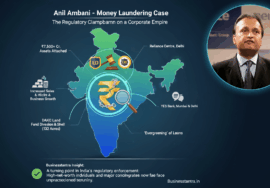UAE urges family-owned businesses to list on local bourses
[ad_1]
The UAE is encouraging more family-owned businesses to list shares on the country’s stock exchanges in a move to enable easier succession in companies and provide more liquidity to local bourses, a top government official said.
“It is encouraged a lot, we’ve seen family-owned businesses structure themselves to be able to exit partially or fully into IPO [initial public offering],” Ahmad Al Falasi, Minister of State for Entrepreneurship and SMEs, told The National on the sidelines of the Top CEO Forum in Dubai on Thursday.
“Once you list that company, the level of data that goes into the processes makes it easier as well for succession, for inheritances, because you are now being listed, you’re reporting and auditing, you’re in a shareholder structure that makes it much more friendly for succession as well,” he said.
Additionally, listing more family-owned businesses that are “big names” and “big conglomerates” is injecting significant levels of liquidity into UAE’s stock markets, Mr Al Falasi said.
“Adding that liquidity … goes a very long way,” the minister said.
However, some family business owners choose to retain control of the business, he said.
“It’s difficult to understand that you can still be a family business and listed … when you list you’re not giving away your company, you’re becoming much more better structured.”
The Abu Dhabi Securities Exchange, the second-biggest bourse in the Arab world after Saudi Arabia’s Tadawul Stock Exchange, more than doubled its market capitalisation last year to a record Dh1.6 trillion — making it one of the best performing exchanges globally in 2021.
Despite subdued IPO activity globally in the wake of Russia’s war in Ukraine that has roiled equities and commodities markets, interest in IPOs has remained strong in GCC markets. Higher oil prices and a strong economic recovery have boosted investor confidence and shored up liquidity in the UAE’s capital markets.
Dubai, which aims to boost its stock market amid a growing appetite for IPOs in the region, revealed plans last year to list 10 state-owned companies as part of its strategy to double the size of its capital market to Dh3tn and attract foreign investment.
Family businesses account for about 90 per cent of private companies in the UAE. The UAE Ministry of Economy said last year it was considering new policies to help family businesses grow as they form a vital part of the country’s continuing transition to a more sustainable economy.
In January, the UAE issued a new family business ownership governance law, further strengthening the sector’s contribution to the economy and facilitating the transition to successive generations.
The focus is now on the small-to-medium segment of family businesses and offering them guidelines on best practices, Mr Al Falasi said.
“What we’ve found increasingly difficult in the region is that third-generation family owners run the business as a one-man show. We want them to structure the business in a way that uses continuity going forward — that doesn’t necessarily happen until they reach the multibillion [stage].”
:quality(70)/cloudfront-eu-central-1.images.arcpublishing.com/thenational/JAKHL566CRDVDOJH4VLLRSKPUM.JPG)
Consultations are under way with a group of small-to-medium-sized family businesses to understand their requirements, Mr Al Falasi said.
Such companies highlighted the need for guidelines on structuring their businesses, getting access to affordable legal advice on structuring and changing the mindset on talking about succession within different generations in a family-owned firm, he said.
Policymakers are encouraging more family businesses to go public by making the markets more appealing and more liquid and adjusting regulations to make it easier for these companies to list, Mr Al Falasi said, pointing to the Nasdaq Dubai Growth Market, a financial exchange launched in 2020 to help small, fast-growing companies to access capital markets.
The exchange allows listings of SMEs with a value of below $250 million. Companies only need to have operated for one year, compared to three for Nasdaq Dubai’s main market, and can sell a minimum of 25 per cent of their equity, allowing founders to retain control.
Updated: May 19, 2022, 1:20 PM
[ad_2]
Source link










